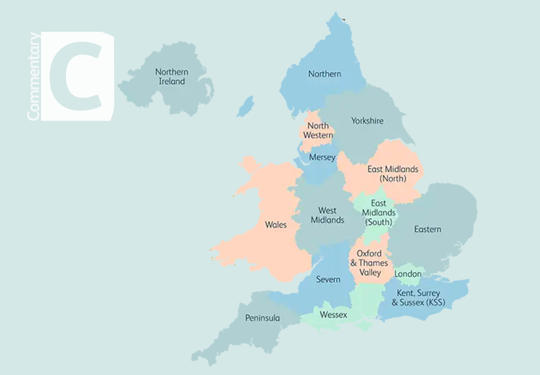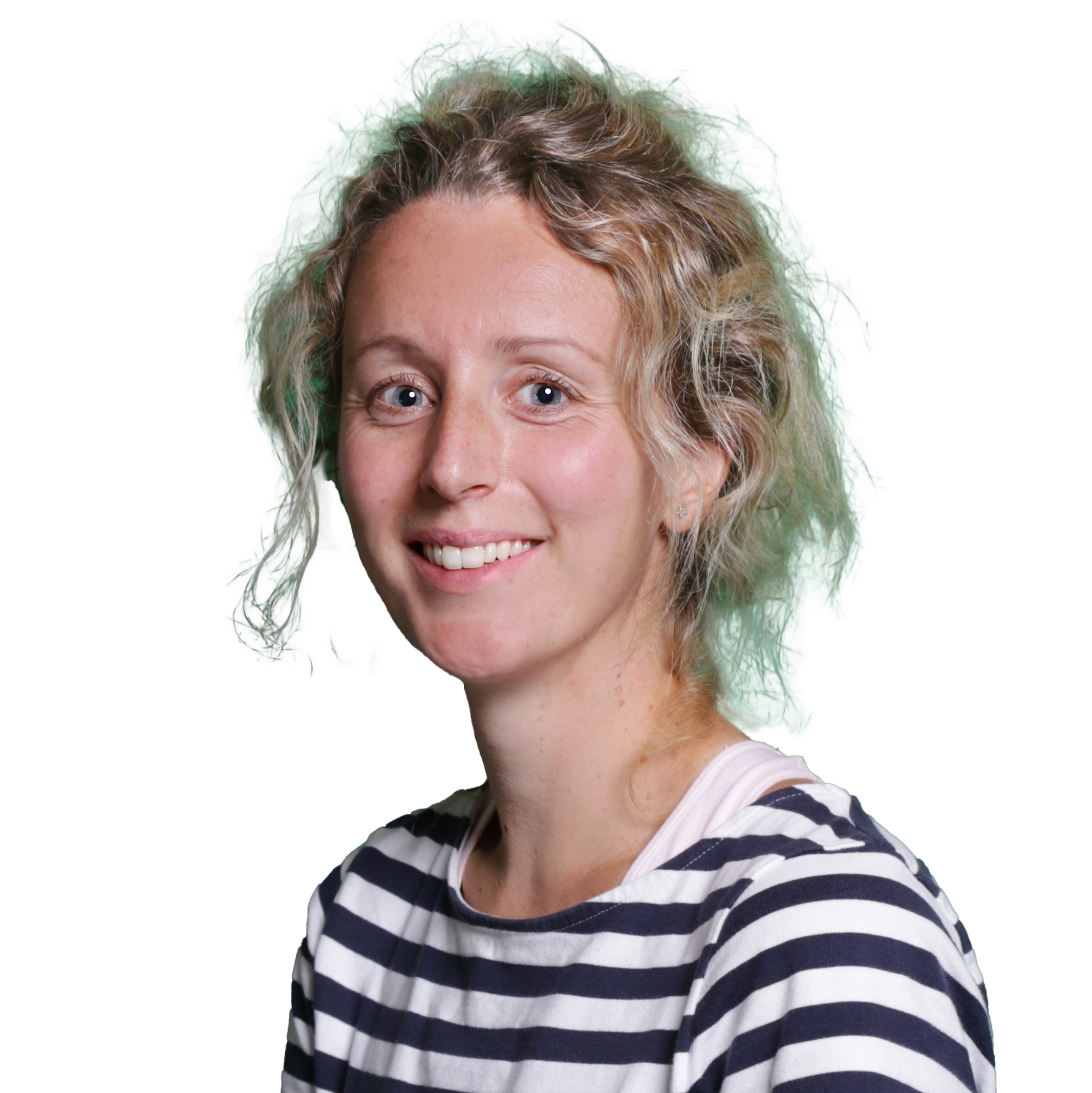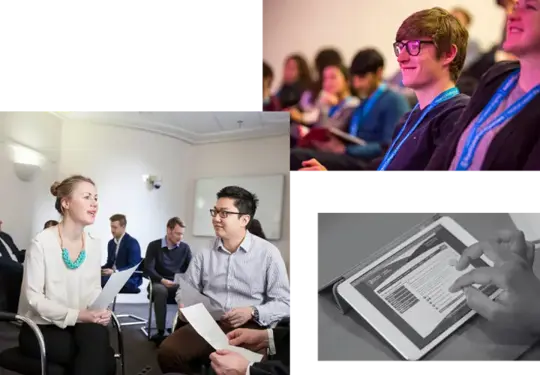Healthcare policy and training often revolve around ‘national’ questions – especially within the NHS. It can be a struggle to ensure that local variations in health and care are understood and addressed.
The RCP UK regional network gives members and fellows the opportunity to change this, offering them the chance to represent their region and ensure that local issues are understood at a national level. The RCP has a network of 18 regions across England, Wales and Northern Ireland, which act as local hubs for RCP activity and engagement.
The dedicated regional teams offer physicians access to CPD activities, training and conferences wherever they live – as well as networking opportunities and a chance to get involved and represent their local area.
Dr Shruti Konda, the RCP’s Linacre fellow, shares her work in the RCP regions:
‘I’m fortunate to collaborate closely with our fantastic associate college tutor (CT) and associate college tutor (ACT) networks across England, Wales, and Northern Ireland, as well as the dedicated regional team at the RCP. I also have the privilege of working with medical students, resident doctors throughout their entire training journey, and consultant colleagues beyond this.
‘My aim as Linacre Fellow is to help bridge education and clinical practice, ensuring that medical training programmes remain both robust and relevant across the UK. I support and help develop the CT and ACT networks across regions. These networks are vital, providing essential peer support, facilitating knowledge sharing, and promoting best practices across institutions and regions. Together, these roles and networks, which help to bring regions together, help to maintain excellence in physician education and ultimately improve patient care.’
Regional roles
There are lots of exciting regional roles and opportunities that are available to RCP members at any stage of their career.
- Update in medicine conferences: These 1-day events are held across the UK every year, and are designed to provide high-quality education and networking opportunities. Every conference will include a diverse range of speakers and specialties, as well as an update from RCP senior officers.
- College tutor (CT) / associate college tutor (ACT) network: CTs and ACTs provide valuable and important support to the RCP and their trust and health education board, ensuring high-quality training by overseeing and supporting resident doctors through their education.
- Regional advisers: These local advocates advise the RCP on a range of training, teaching and health service activities that are pertinent to the work of physicians. They are your local voice and connection to the RCP, and have the opportunity to raise issues on the ground – or share examples of good practice.
- Join the RCP networks and committees: The range of RCP networks and committees are often looking for regional representatives at varying stages of their careers. It can be a great opportunity to bring your local perspective to groups that influence national policy – including on the SAS regional representative network, Student and Foundation Doctor Network, New Consultant Committee or Resident Doctor Committee (RDC). These groups focus on a variety of issues, including improving communication between doctors, improving working lives and challenging educational dogma.
- Other events: The RCP also offers a variety of opportunities to share your views, ask questions and help shape the strategy and direction of the RCP; these range from virtual ‘meet your president’ events to trust visits from RCP officers.
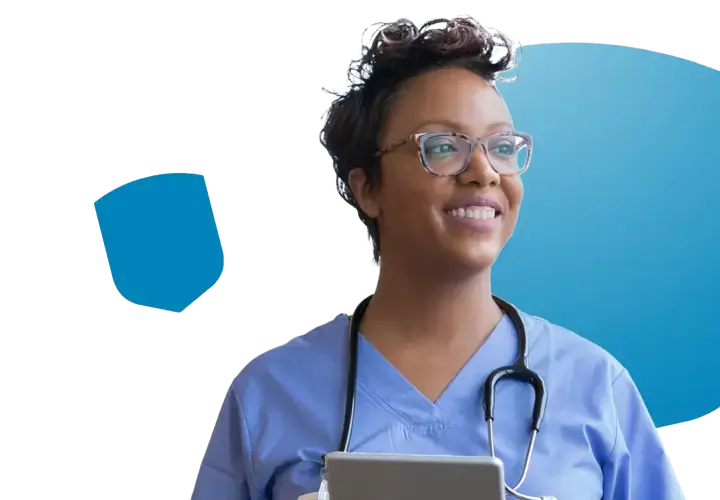
Spotlight on RCP regional work in Wales: building community, amplifying voices
From national CT meetings to grassroots forums, resident doctors in Wales are helping to shape training and strengthen networks, supported by the RCP Cymru Wales team. Dr Nicola Maddox, Commentary guest editor, speaks to Dr Sacha Moore and Dr Charlie Finlow, RDC representatives for Wales.
‘At RCP Cymru Wales we are fortunate to be part of a close-knit team, working all year round to support physicians across Wales. As resident doctor representatives, we feel especially privileged to benefit from the hugely supportive leadership, past and present, of RCP Cymru Wales. Alongside colleagues, we strive to ensure that the resident doctor voice is heard and valued in everything we do.
'Building community and driving meaningful improvement are key parts of our role. To this end, in the autumn we will host our annual in-person meeting of CTs and ACTs. It is one of the highlights of the year; a gathering that brings together colleagues from every corner of Wales, alongside senior figures including the RCP vice president for Wales, regional advisers, training programme directors and representatives from Health Education and Improvement Wales (HEIW). The day is rich with discussion, ranging from leadership workshops to exploring getting the most out of the supervisor–supervisee relationship. Crucially, it not only provides ACTs with examples of innovative practice to take back and implement locally, but also gives a direct line to senior leadership that ensures feedback is heard where it matters most.
'Looking ahead to December, we are excited to try something new: an evening event for resident doctors held the evening before the Cardiff Update in medicine. Over a shared meal, colleagues will have the chance to network informally and join two open forum sessions hosted by us; these will focus on generating solutions to local priority areas of challenge. Additionally, RCP president Professor Mumtaz Patel and registrar Dr Omar Mustafa will be there, offering resident doctors in Wales the opportunity to engage directly with the RCP senior team. The evening promises to be both engaging and impactful, linking grassroots perspectives with national leadership in a collegiate and relaxed setting.
'Between these events, our Wales-wide WhatsApp group for ACTs provides a continuous channel for connection, advice and shared learning, ensuring that support never stops at the end of a meeting.
'We are looking at applying this method in the creation of a network of higher specialty doctors in training in 2025–26, ensuring that the geographical challenge of working across a whole country doesn’t limit our connectivity.
'None of this would be possible without the foundations laid by the hard work of our predecessors, including Dr Alexandra Burgess, Dr Richard Gilpin and Dr Melanie Nana. Nor would our work be possible without the tireless dedication of the RCP Cymru Wales staff.'
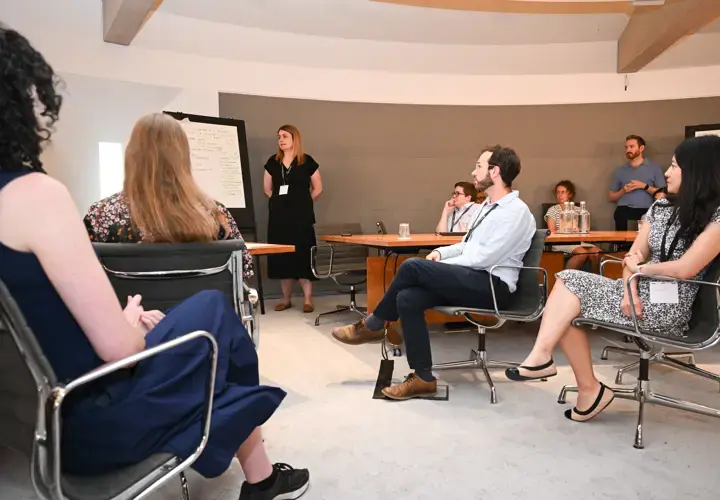
Regional managers
Regional managers act as the central focal point of support for RCP members and clinicians within their respective region. They work closely with physicians across the RCP to help communicate with members within the region, deliver conferences, develop relationships with regional membership networks and ensure that their views are heard within the RCP.
The first regional office was piloted in Newcastle in 1996. The minutes of the RCP Council meeting held 12 June 1996 state: ‘It was intended to establish more cohesive structures around the country based on the regional office scheme being piloted in Newcastle.’ Subsequently, the Manchester regional office opened on 7 May 1998, and the West Midlands office opened 28 September 1998.
Many of the regional events and initiatives are designed to support physicians at specific career stages. However, the RCP also organises a variety of non-career stage-specific events, including Update in Medicine conferences and RCP Player webinars, providing clinical CPD. These events are crucial for providing continuous education and fostering a sense of community among physicians.
Commentary guest editor Dr Nicola Maddox, who has worked as an ACT and RDC representative in the south-west, speaks to RCP regional managers about their roles – and how physicians can get involved: Jacqui Sullivan (JS), RCP nations manager for Wales and Northern Ireland, Holly McCarthy (HM), regional manager for Kent, Surrey, Sussex, London and Wessex and Jenny Ward (JW), regional manager for East and West Midlands, Oxford and Thames Valley and Eastern regions.
How can regional managers benefit RCP members?
JS: We are the link between the college sites in London and Liverpool, and our members in our region/nation. We organise regional events and can signpost our members to others locally, or to colleagues/activities within the college.
JW: We are the connection that links our members to both London and Liverpool, and across the regions that we manage. Regional events are available to anyone across the UK to attend if they so wish and are promoted nationally on the RCP website. We are the point of contact for a variety of queries and if unable to assist will always find someone who can.
HM: Regional managers are often the first point of contact for our members and fellows. We specialise in organising meetings and events that bring people togethe, and we’re well placed to highlight opportunities to support you in your role.
What are your suggestions for RCP members looking to get involved with their regional team?
JS: Drop your regional manager an email or come and say ‘hello’ at an event. If a member is interested in getting more involved with the RCP, the regional manager can talk to them about the relevant opportunities open to them. For example, I have got to know foundation doctors who have taken part in the RCP virtual poster competition. When they ask about opportunities, I talk to them about the ACT role, which is open to all IMTs, and how being an ACT can develop their leadership skills and in turn enhance their portfolio.
Regional managers are often asked to put members forward to participate in events led by the Regional Services team. By building a relationship with members at a local level, we can recommend people who might be suitable for the opportunity.
JW: Always make contact with your regional manager if you are keen to become involved, always happy to enquire what support is required and where support could be offered in regional activities or in some cases more national events. Interaction with those who express, and interest often leads to many opportunities in either RCP representative roles or other committees, which are all great developmental opportunities.
HM: Start by reaching out to your regional manager! We can connect you with opportunities within the regional team or beyond, and we’ll always be able to point you in the right direction.
What would be your top tip for ACTs starting in their role?
JS: Get in touch with your local RCP resident doctor representatives. They are a good source of information and can help you with any issues that are raised by your colleagues. Their role is to raise awareness of concerns across the UK with the national Resident Doctor Committee and college officers. You can find out who your regional representatives are via the regional pages on the RCP website.
JW: Definitely to make contact with others in the same role or RCP resident doctor representatives to be sure how best to develop within your role
HM: Get to know who is here to support you at the RCP. Your regional manager and the Linacre Fellow are just a phone call or email away, ready to help you settle into the role.
What do you love most about this role?
JS: I am now in my tenth year with the RCP and what I love most about this role is witnessing the growth of resident doctors who I met early in their careers. Seeing them develop confidence, step into leadership roles and truly find their voice is incredibly rewarding. It’s a privilege to be part of their journey, to support and encourage them as they evolve into capable, compassionate leaders who will shape the future of healthcare.
JW: Having completed nearly 8 years at the RCP, whilst ‘every day can be a school day’ in learning something different regarding the operations of the RCP, I am fortunate to work with some amazingly team spirited and professional people, always there to support one another when needed. I have also seen those entering at foundation level, become involved in RCP activities and also flourish in their careers as they progress in their medical training.
HM: Meeting members and fellows in person, especially at our Updates in medicine events. These are fantastic occasions full of learning, networking, and connection.





